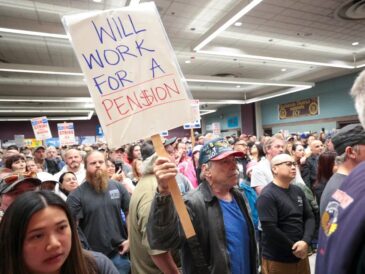Seattle, Nov. 1, 2024 – Boeing Company and the union leaders representing 33,000 striking workers reached a tentative agreement to end a lengthy labor dispute that’s crippling the company’s commercial airplane manufacturing.
The company’s latest proposal would boost wages by 38% over four years and give workers a $12,000 signing bonus if it’s approved, the International Association of Machinists and Aerospace Workers said in a statement.
IAM District 751 urged its members to accept the Boeing offer and end the strike, warning they risked losing gains they’ve made after weeks of collective bargaining. The union plans to hold a vote on the proposal on Nov. 4.
“In every negotiation and strike, there is a point where we have extracted everything that we can in bargaining and by withholding our labor,” the union said late Thursday. “We are at that point now and risk a regressive or lesser offer in the future.”
Boeing’s shares rose as much as 2.8% in after-hours trading. The stock had plunged 43% so far this year through the close of Thursday’s session.
The latest attempt to end the labor strife comes after 64% of members of IAM District 751 voted to reject Boeing’s third contract offer, which would’ve hiked wages by 35% over four years.
Ratification would represent a critical win for new Chief Executive Officer Kelly Ortberg, clearing the way to move forward with plans to rebuild Boeing’s culture and improve the quality of work in its factories.
On Monday, the company shored up its balance sheet by raising $21 billion in capital to fund its recovery.
Now, Ortberg’s team and union negotiators have made progress toward breaking the deadlock with assistance from acting US Labor Secretary Julie Su, who’s played a role in ending other strikes.
Su commended the machinists and Boeing’s leadership teams for striking a tentative deal that paved the way for a fresh vote. “I always say that collective bargaining works and there are few better examples of this than workers demanding and getting unprecedented gains,” she said in a statement.
Last year, Su helped facilitate deals between Kaiser Permanente and thousands of its healthcare workers, as well as West Coast dockworkers and port operators.
More recently, she and others in the Biden administration stepped in to help end a days-long strike that shut East and Gulf Coast ports.
The work stoppage by Boeing’s largest union is approaching the two-month mark, squeezing the planemaker’s suppliers, and rippling through the US economy.
Production of the cash-cow 737 Max and other jetliners has been shut down since workers walked off the job on Sept. 13, idling Boeing’s IAM-represented plants across the West Coast.
Instead of generating cash in the fourth quarter, the company now expects to burn through around $4 billion, which would bring total outflows for the year to $14 billion.
The strike has also caused an estimated $9.66 billion in total economic losses, far outweighing the early October walkout by dockworkers, according to the Anderson Economic Group. The tally includes lost wages, lost earnings, supplier losses, customer impact and fallout to the local economy in Washington and Oregon.
The IAM strike is driven by resentment over the terms of a controversial 2014 agreement that curbed pay and eliminated pensions for new employees at a time when senior executives were richly rewarded.
The latest offer doesn’t reinstate the Machinists’ defined benefit pension plans, a key demand for older workers. But it helps workers build their retirement savings and recoup losses from the years when their wage increases didn’t keep pace with inflation.
Boeing’s 38% wage increase would include a 13% bump in the first year. In all, it compounds to a 44% increase over the span of the four-year contract, the union said.
The agreement includes a guaranteed 4% annual bonus for workers. The $12,000 bonus if the deal is approved is up from the company’s initial $3,000 sweetener.
“It’s time for our members to lock in these gains and confidently declare victory,” the union said, Thursday.
“We believe asking members to stay on strike longer wouldn’t be right as we have achieved so much success.” (Bloomberg)





